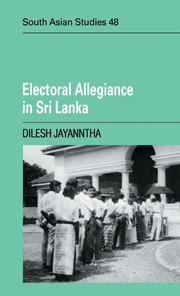Book contents
- Frontmatter
- Contents
- Acknowledgments
- List of abbreviations
- 1 Introduction
- 2 Bluville: the constituency and the patronage network of Doctor Ay (1947–1959)
- 3 Bluville: the patronage network of Korale-Mudaliyar Kit Foo and his son, Dee (1947–1959)
- 4 Bluville: the growth of the State (1956–1982)
- 5 Greenville: the patronage networks of the Mou/Nous and the Pou/Kous (1947–1959)
- 6 Greenville: the growth of the State (1956–1982)
- 7 Red Town: the urban setting (1947–1959)
- 8 Red Town: the growth of the State (1956–1982)
- 9 Communal minorities, political dissidents and the JVP
- 10 Conclusion
- Glossary of Sinhalese Terms
- References
- Index
- CAMBRIDGE SOUTH ASIAN STUDIES
6 - Greenville: the growth of the State (1956–1982)
Published online by Cambridge University Press: 11 September 2009
- Frontmatter
- Contents
- Acknowledgments
- List of abbreviations
- 1 Introduction
- 2 Bluville: the constituency and the patronage network of Doctor Ay (1947–1959)
- 3 Bluville: the patronage network of Korale-Mudaliyar Kit Foo and his son, Dee (1947–1959)
- 4 Bluville: the growth of the State (1956–1982)
- 5 Greenville: the patronage networks of the Mou/Nous and the Pou/Kous (1947–1959)
- 6 Greenville: the growth of the State (1956–1982)
- 7 Red Town: the urban setting (1947–1959)
- 8 Red Town: the growth of the State (1956–1982)
- 9 Communal minorities, political dissidents and the JVP
- 10 Conclusion
- Glossary of Sinhalese Terms
- References
- Index
- CAMBRIDGE SOUTH ASIAN STUDIES
Summary
Introduction
In 1952, Nerti Nou had won Greenville by a sizeable majority, securing over 60 per cent of all votes cast. However, in 1956, he lost by an equally sizeable majority to Mrs Rou who was contesting on the SLFP ticket. He attributes the large swing against him to two factors. First, it represented a part of the national swing. Nou believes that the vast majority of new voters, especially those outside Groville Korale, were likely to have voted against him, as they did against most sitting UNP MPs. Secondly, polling in Greenville being on the third and last day of the election when his party had secured only eight seats to the MEP coalition's forty-two, a vote for him would have been a vote for a candidate of the defeated party; a candidate unlikely to be able to reward supporters with any form of State patronage over the next five years. In this context, marginalistic, opportunistic groups are likely to have turned against him, as they had against the Doctor in Bluville three days earlier.
Given this, what is surprising is not that Nou lost, but that he managed to secure as much as a quarter of the total polled; this, when the Opposition seemed certain to form the next Government and his rival to hold a senior position in it. Nou regards these votes as having come from his hard-core support of family clients. This hard-core support was largely from the northern part of Groville Korale, where his family and that of the Mous controlled land and temples and had village headmen under obligation to them.
- Type
- Chapter
- Information
- Electoral Allegiance in Sri Lanka , pp. 110 - 136Publisher: Cambridge University PressPrint publication year: 1992



